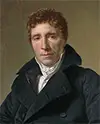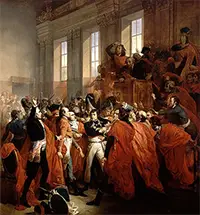The French Directory
Part 3: The End of the Revolution In 1799, France found itself again at war on multiple fronts, against multiple enemies. Back in the fray was Prussia. New to the conflict was Russia. This new alliance formed the basis of the War of the Second Coalition. The allies enjoyed some initial victories, but France again scored decisive victories, sending its enemies retreating, in one case over the Alps. The elections for the Directory and the two legislatives Councils took place in March and April 1799. The result was a period of political chaos, as royalists and republicans jostled for supremacy amidst the backdrop of war. A group of Jacobins opened a new political club called the Club du Manege, along the lines of the clubs that were popular in the early days of the Jacobin Clubs. The Councils called for a forced loan of a large sum of money, in order to finance the ongoing war effort and to keep the government finances afloat; as well, the Councils called for a new round of conscription, the first since 1793. A great uncertainty accompanied a growing instability, and many French people longed for the days when they could predict what was going to happen from day to day. Operating amid uncertainty was the Directory as well. Suspicious of the possible radical intentions of the Club du Manege, the Directory ordered it closed, in August 1799. 
The end of the Directory came in 1799, as the result of the Coup of 18 Brumaire. Emmanuel-Joseph Sieyès (right), a leader of the Revolution from as far back as the late 1780s, won election to the Directory. He then overthrew the government, although things didn't go exactly as planned. The plan was to initiate a takeover by devious means, by inventing a conspiracy and then tricking the government into handing over the reins in time of crisis. Helping execute the plan were to be Joseph Fouché, the Minister of Police; Pierre François Réal, the Commissioner of the Directory; Charles-Maurice de Talleyrand; and Lucien Bonaparte, who was a brother of Napoleon and who was also the head of the Council of Five Hundred. The plan was for three of the five Directors to suddenly resign, leaving the government with no functioning executive arm. Then, the Councils would hear of an alleged conspiracy that necessitated the movement of the deputies to a safe location a few miles outside Paris. Because it would be a time of war, since the republic was threatened from within, the Councils would be dissolved and a handful of its deputies would set about writing a new Constitution. This was a pattern that had been followed in recent years. The coup plotters brought the army in on the deal, and Fouché was to ensure that the police did their part. Also playing a part would be Napoleon himself, by this time a war hero with several well-known victories under his belt. 
On November 9, deputies in the Council of Ancients heard of the alleged conspiracy at an emergency meeting, at which they agreed to meet the following day at the Château de Saint-Cloud. They also assented to allowing Napoleon to assume command of troops in Paris. A few hours later, the same set of events occurred at a meeting of the Council of Five Hundred, with the same result. Troops then arrested two prominent Jacobin directors, in keeping with the story that it was a Jacobin plot to take over the government. The following day, the Councils met separately, with Napoleon speaking to each group. The Council of Ancient offered no opposition. The Council of Five Hundred did, but only for a time, in the form of harsh verbal resistance from a handful of Jacobin deputies. In the end, after soldiers had intervened and removed the agitators, the lower chamber reconvened and approved the formation of a new government, by way of the Constitution of Year Ⅷ. In this case, the government was the Consulate, which placed maximum power in the hands of a very few. This, many historians say, was the end of the French Revolution. First page > In the Shadow of Internal Violence > Page 1, 2, 3 |
|
Social Studies for Kids
copyright 2002–2026
David White




